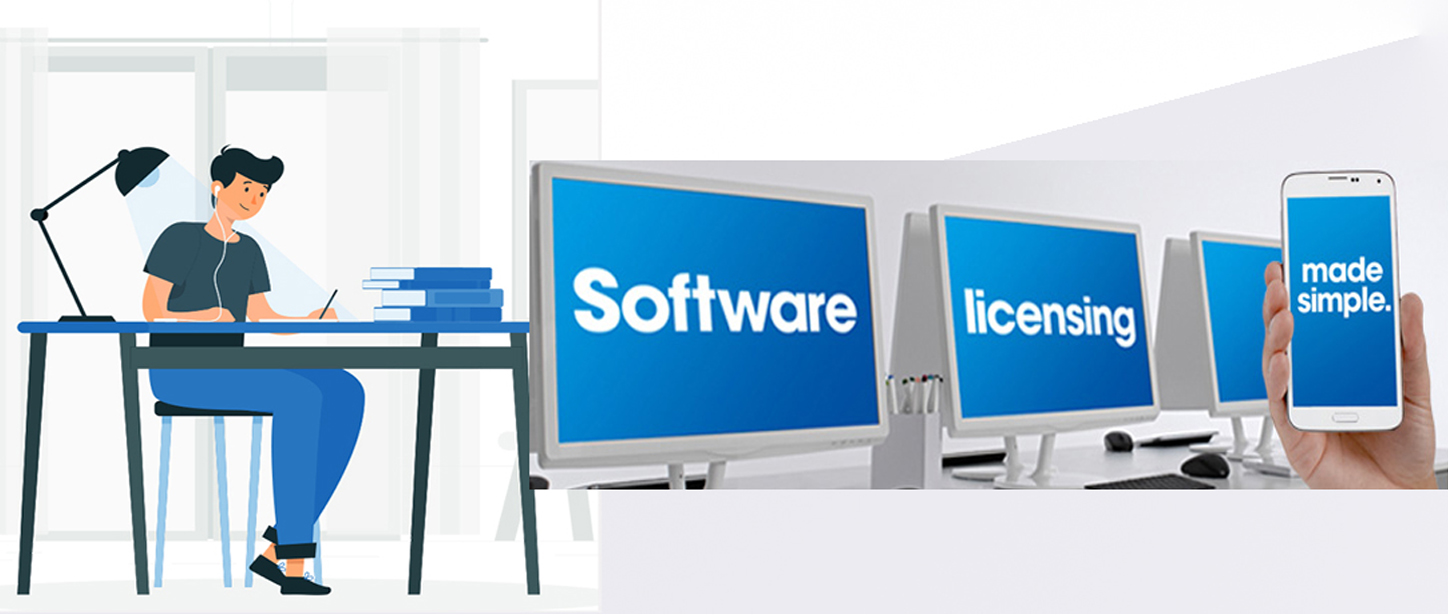Software Licensing Solution
A software license is a kind of license that is used to set rules about how a piece of software can or cannot be used. After getting the software by either downloading it or buying it, you need to agree with the license in order to use it. The license is chosen or created by the software developer/creator or software publisher. It is a legal instrument allowing consumers to use or redistribute software. Without the license agreement, using the software would constitute a breach of copyright law. The particular license agreement will explain to the end-user how they can use the software. Where software is not covered by any license, it is normally categorized as:
Public domain software – freely available for use and not copyright protected
Private unlicensed software – such as business applications still falls under copyright protection.
Public Domain License
This is a “permissive” license that allows adopting the code into applications or projects and reusing the software as desired. That is in the public domain, anyone is free to use and modify the software without restrictions. Having said that, Public domain software may not always adhere to best coding practices. Furthermore, Code that doesn’t have an explicit license is NOT automatically in the public domain. A programmer or company that creates copyrighted software can choose to forego that copyright by donating the software to the public domain. Software in the public domain can be freely shared, modified, distributed, commercialized, and relicensed by the end user with essentially zero restrictions.
Literary works like the plays of William Shakespeare and famous novels like A Christmas Carol (Charles Dickins) or The Time Machine (H.G. Wells) are also part of the public domain. That means anyone is free to reprint, reproduce, recreate, or reinterpret these works, sell them, and make a profit.
The intellectual property associated with these works, as with open source software, belongs to the public.
GNU/LGPL – GNU Lesser General Public License (LGPL)
This license gives the rights to developers to link to open-source libraries within their own software. The resulting code can be licensed under any other type of license. The GNU Lesser General Public License (LGPL) was also created by the Free Software Foundation. This type of software license permits the end user to modify the program and incorporate the derivative version into a proprietary software product that can be licensed on their own terms and at their own discretion. This stands in contrast to the terms of the GPL software license types, which typically require creators of derivative works to give away the source code for free.
Permissive
A permissive license is like a public domain license, but it may contain limited restrictions on how the end user may modify or distribute the software. The benefit of permissive licensing for software creators is that it allows them to retain their intellectual property and maintain some control over how their software is used while continuing to support open-source development and even licensing their product for free. There are several sub-types of permissive software licenses, each with its own specific terms and conditions for how the licensed software may be modified or redistributed.

Copyleft
Also termed as Restrictive or Reciprocal Licenses, these licenses allow you to modify the licensed code and distribute new works based on it, as long as you distribute any new works or adaptations under the same software license. Well known example of Copyleft Licenses is GPL. Restrictive licenses may be referred to by several other names, including reciprocal licenses and copyleft licenses (a play on the term copyright). The most common restrictive software license type in use today is the GNU General Public License (GPL) v3.0, created by the Free Software Foundation.
Proprietary
As the name defines it, this is the most restrictive type of software license, protecting the developer or owner from unauthorized use of the software. Most IT organizations will primarily deal with proprietary software licenses from major vendors like Microsoft, Oracle, Adobe, and IBM. Navigating these software license agreements is a complex process, frequently requiring collaboration between IT professionals and legal advisors specializing in technology and contract law.
Benefits of Software Licensing
- SLA (Service Level Agreements) and problem mediation process.
- Distribution of limitations and permission.
- Use rights, such as copying or modifications
- Copyright definition, including software and any documentation
- Dates – for installation, training, support assistance, and license duration
- Termination terms, penalties, financial liabilities
- Software license protects business users and individuals from liability and copyright infringement claims
- The number of eligible users of the software becomes clear
- Includes maintenance, upgrades, support
- Any performance guarantees and remedies.

When any organization purchases software, it enters itself into a license agreement with the licensor upon installation or first-time access. These End-User License Agreements (EULA) define ways under which the product can be used. An efficient licensing system requires a complex vision, utilizing the best world practices and smart management. DSI Solutions Dubai features a software licensing service that helps to meet the profit targets of the product sales team, gain clean and efficient customer experience, prevent any misuse of copyrighted software products and resolve any judicial issues. We offer a variety of licensing options so organizations can more easily manage their software while ensuring the end-user has the tools they need, when they need them.
Microsoft Licensing Solutions
DSI Solutions Dubai team can help you in your Microsoft license requirements, usage, analyze and plan your licensing requirement and adopt a cost effective and scalable licensing policy. DSI Solutions Dubai team consist of right mix Microsoft Licensing Sales Experts and Microsoft Certified Professionals (MCP) who can help organizations whether small, medium or enterprise; effectively plan the licensing requirement across all the Microsoft Products whether it be desktops, server platforms or clouds-based licensing. Customers can get the benefits of Microsoft Volume Licensing accessing the software that is most important to their business.
DSI Solutions Dubai skilled team for almost all the range of Microsoft Product backed by solid IT Infrastructure team can perform an audit on the existing license, your future plan and requirement and then come up with a licensing model which has minimum investment and which scale as your business grows.

Highly Diversified
DSI Solutions Dubai has highly diversified IT services offering we can be your perfect partner right from sourcing your IT infrastructure (hardware and software), building your complete IT infrastructure (on premise or on cloud). With such a diversified offering you get a single window to efficiently management your complete IT requirement.
Microsoft Cloud Licensing
DSI Solutions Dubai has Microsoft Azure licensing services we can make a complete IT infrastructure comprising of software and hardware. You can have a fast deployment without any worry about underlying platform and only focus on moving into cloud along with scaling up on demand as your business grows.
Microsoft 365 Licensing
Microsoft Office 365 has varied offerings and DSI consultants have the knowledge to work closely with you and identify the right package which is suitable for your business. We can assess your business requirement and usage patterns and offer right solution. DSI support team can take care of all your problems related to Office 365 on your computer.
Asses the Suitability
DSI Solutions Dubai can help you to ensure that your Microsoft software is compliance at all times and that you are ready for a Microsoft licensing audit. We can assess the suitability of software licensing to meet your IT strategy and projects requirement and identify if they would create budget or compliance issues.
Maximize Returns
DSI Licensing Assessment and audit can help identify where license efficiencies and savings can be made and how compliance issues can be resolved thereby helping you maximize returns on your investments. By identifying your exact requirement and with Microsoft Volume Licensing you can access the software that is most important to you.
Audit Service
DSI Microsoft License audit services can help our customer to understand and alleviate the challenges and risk that a Microsoft Audit creates and stay compliant at all times. Our Licensing Analysis services provide you with an assessment of our customers current licensing contracts and licensing position.

